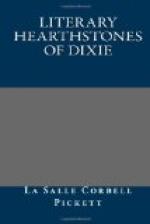When Abram Ryan was seven years old the family moved to St. Louis, where the boy attended the schools of the Christian Brothers, in his twelfth year entering St. Mary’s Seminary, in Perry County, Missouri. He completed his preparation for the work to which his life was dedicated, in the Ecclesiastical Seminary at Niagara, New York. Upon ordination he was placed in charge of a parish in Missouri.
On a boat going down the canal from Lynchburg to Lexington, where he was a fellow-passenger with us, he met his old friend, John Wise, and entered into conversation with him, in the course of which he made the statement that he came from Missouri. “All the way from Pike?” quoted Mr. Wise. “No,” replied Father Ryan, “my name is not Joe Bowers, I have no brother Ike,” whereupon he sang the old song, “Joe Bowers,” in a voice that would have lifted any song into the highest realms of music.
He recited his poem, “In Memoriam,” written for his brother David, who was killed in battle, one stanza of which impressed me deeply because of the longing love in his voice when he spoke the lines:
Thou art sleeping, brother,
sleeping
In thy lonely
battle grave;
Shadows o’er the past
are creeping,
Death, the reaper, still is
reaping,
Years have swept and years
are sweeping
Many a memory from my keeping,
But I’m waiting still
and weeping
For my beautiful
and brave.
The readers of his poetry are touched by its pathetic beauty, but only they who have heard his verses in the tones of his deep, musical voice can know of the wondrous melody of his lines.
When I said to him that I wished he would write a poem on Pickett’s charge at Gettysburg, he replied:
“It has been put into poetry. Every flower that blooms on that field is a poem far greater than I could write. There are some things too great for me to attempt. Pickett’s charge at Gettysburg is one of them.”
A lady who chanced to be on the boat with us repeated Owen Meredith’s poem of “The Portrait.” At its close he said with sad earnestness, “I am sorry to hear you recite that. Please never do it again. It is a libel on womanhood.”
It may be that he was thinking of “Ethel,” the maiden whom, it is said, he loved in his youth, from whom he parted because Heaven had chosen them both for its own work, and his memories deepened the sacredness with which all women were enshrined in his thought. She was to be a nun and he a priest, and thus he tells of their parting:
One night in mid of May their
faces met
As pure as all the stars that
gazed on them.
They met to part from themselves
and the world;
Their hearts just touched
to separate and bleed;
Their eyes were linked in
look, while saddest tears
Fell down, like rain, upon
the cheeks of each:
They were to meet no more.




